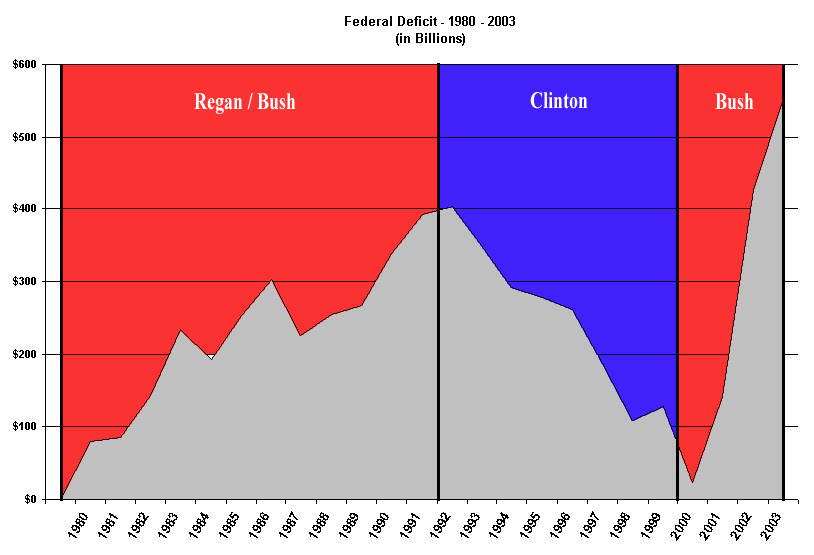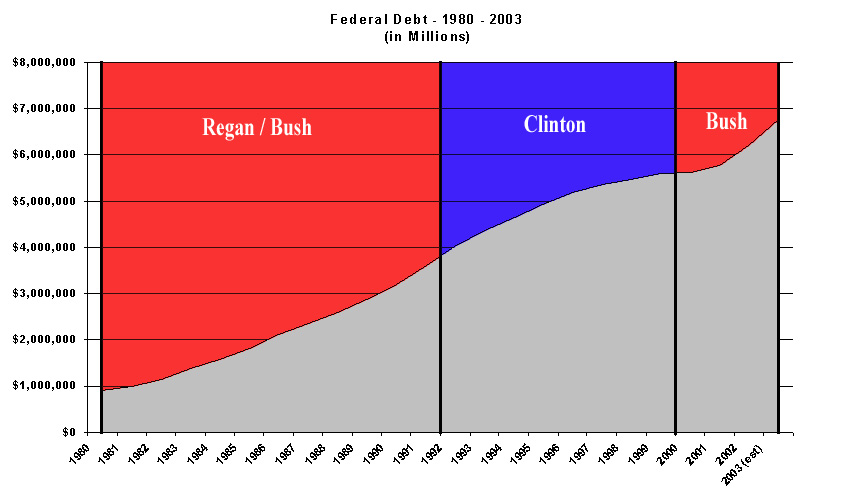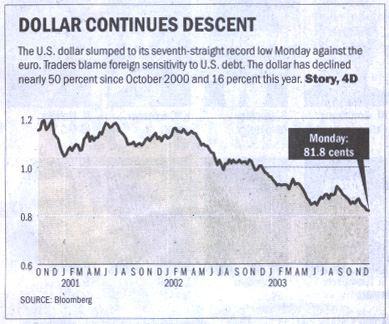Source: "Applying Brakes to Benefits Gets Wide G.O.P. Backing" by Robert Pear - New York Times - 1/9/05
The government's deficit ballooned to $326.6 billion in the first nine months of the 2004 budget year, according to a snapshot of U.S. balance sheets released Tuesday [7/13/04]. That's more than 20 percent larger than the $269.7 billion shortfall for the corresponding period last year.
Source: Dallas Morning News "Briefs" - 7/14/04
The current policy of borrowing money to fund the government is unsustainable in the long run.
The Reagan administration introduced the 1981 Economic Recovery Act by claiming that it would cut taxes by 30 percent, increase defense spending by three-quarters of a trillion dollars, and achieve a balanced budget within three years. Budget director David Stockman admitted in November of 1981 that, "None of us really understands what's going on with all these numbers" and that supply-side economics "was always a Trojan horse to bring down the top rate."
Source: "The Mendacity Index - Which president told the biggest whoppers?" -- Washington Monthly -- September 2003
The Republican party has long used the term "Tax and Spend" to assail the Democratic party. However when Republicans control the government, they resort to the less responsible process of "Borrow and Spend."
Neither party seems capable of controlling spending. This is primarily due to the fact that most of the money spent by the federal government goes to entitlement programs. The government isn't spending the money…we are. Since the government (under either party) insists on spending more and more money, the question becomes "do we pay-as-we-go, or do we live on borrowed money and pass the debt on to future generations?"
The Bush administration believes that tax cuts that result in borrowing will increase investment and thereby create jobs. The jobs will create new tax revenue, which will eliminate the need for the government to borrow money. An analysis of the result of this policy demonstrates that it clearly doesn't work. What does work is raising marginal upper tax rates in order to pay for government programs as the bills accrue, as practiced by the Clinton administration.
Deficit spending by the federal government has failed to spur new tax revenues and has served only to substantially increase the national debt.
There is a way to give U.S. taxpayers substantial tax cuts. Currently interest payments on the national debt amount to around 15% of every tax dollar Americans send to the federal government. Paying off the national debt would eliminate this expense, which would allow for deep, long term tax cuts for all Americans.
The following table lists the actual amount of interest paid by the federal government during the last several years. (Around half of this money goes to lenders outside of the U.S.)
2002 - $332,536,958,599.42
2001 - $359,507,635,242.41
2000 - $361,997,734,302.36
Source: "Interest Expense on the Debt Outstanding" - http://www.publicdebt.treas.gov/opd/opdint.htm
The Federal debt is still growing. On February 28, 2003, the public debt was $6,445,790,102,794.08.
Source: "CONCURRENT RESOLUTION ON THE BUDGET FOR FISCAL YEAR 2004" -- House of Representatives -- March 20, 2003 -- The Congressional Record, Pages H2185-H2186
The main reason traders cited for the latest decline in the dollar is foreign investors' sensitivity to the staggering fiscal imbalances in the United States that do not seem to faze domestic investors. "There are many ways this could end in tears, not cheers," said Marcel Kasumovich, head of G-10 Foreign Exchange Strategy at Merrill Lynch in New York.
Source: "Dollar Hits Record Low Again" -- Dallas Morning News - Daniell DiMartino -- December 9, 2003
With the baby boomer retirement imminent, we shouldn't be borrowing money, we should be squirreling it away.

"Significance of the federal debt and deficit"
Source: by R Davis (http://home.netcom.com/~rdavis2/deficits.html)

Source: US Office Of Management and Budget

Source: Dallas Morning News - 12/9/03